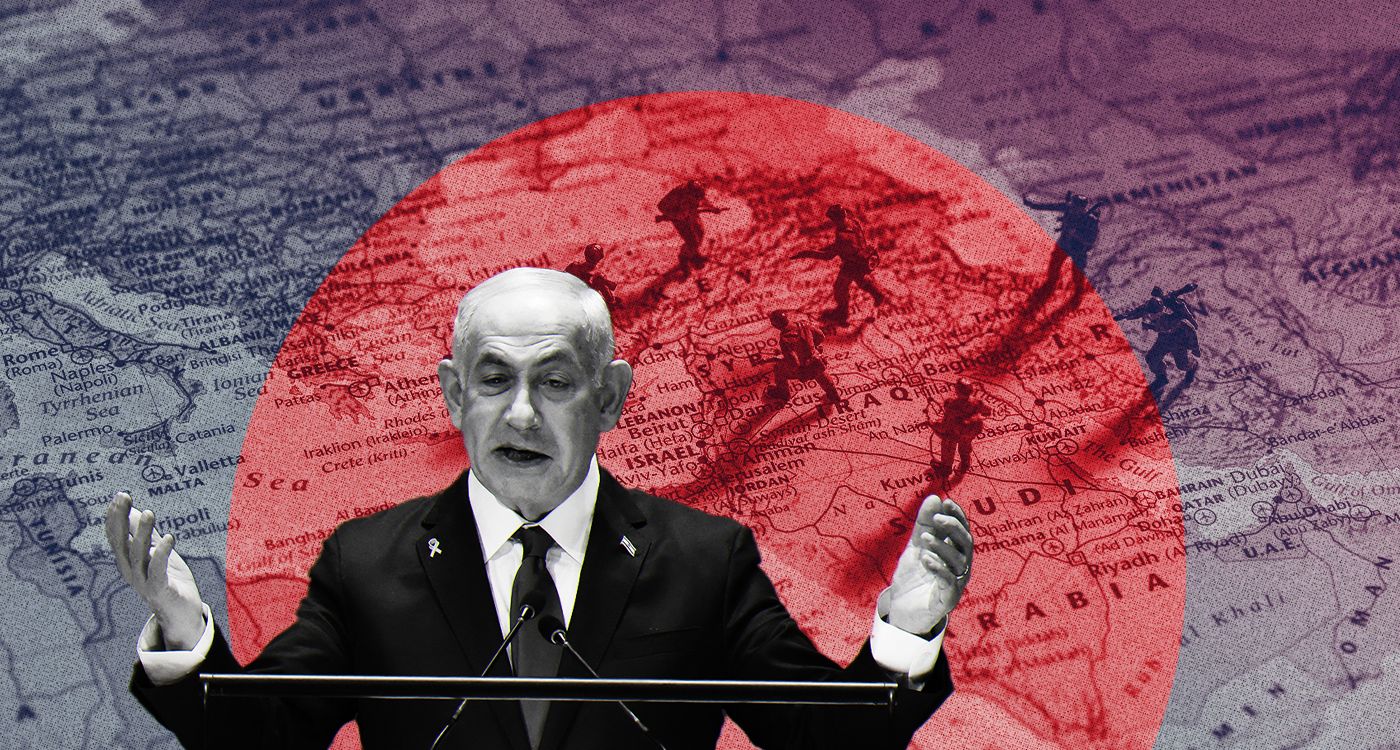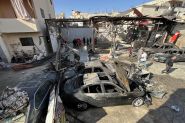
“We are going to change the Middle East." These words, uttered by Israeli Prime Minister Benjamin Netanyahu two days after the October 7, 2023 offensive, appear to be taking shape.
Despite intensified diplomatic efforts to end the war in Lebanon and Gaza, the focus now seems to be on a radical solution. Can diplomatic channels still succeed after a series of failures since the conflict began on October 7, 2023? How far will Netanyahu go in pursuing his war objectives?
In Lebanon, as in Gaza, efforts to end the war are facing significant internal and external challenges, but above all, they are being blocked by Israeli Prime Minister Benjamin Netanyahu’s strong determination to eliminate Iran’s proxies.
On Monday, marking the first anniversary of Hamas's unprecedented attack on the Jewish state, Israeli Defense Minister Yoav Gallant declared in a statement, "We are fully committed to continuing all necessary actions to defeat our enemies and protect our homeland." Meanwhile, Israeli President Isaac Herzog urged the international community to "support Israel in its fight against its enemies.”
During a visit to Israel, following discussions last week in Beirut and to address concerns after French President Emmanuel Macron's call to suspend arms deliveries to Tel Aviv, French Foreign Minister Jean-Noël Barrot reaffirmed France's unwavering support for the Jewish state. He also accused Hezbollah of being responsible for the war currently devastating Lebanon.
Meanwhile, the pro-Iranian group declared its intention to continue "fighting against Israeli aggression" and "eliminating the cancerous entity" that Israel represents to them, as mentioned in a statement on Monday morning.
With a long history of involvement in mediations in the Middle East, the United Nations has been unsuccessfully trying to establish some form of dialogue between Israel and Hezbollah while also seeking to strengthen the Lebanese state's ability to assert its authority over its entire territory.
International stakeholders like the United States and France, which have strategic interests in Lebanon, are continuing to push for a ceasefire. Meanwhile, regional powers such as Iran and Saudi Arabia play a pivotal role in the negotiations, although their historical rivalries complicate the diplomatic process.
On the ground, reinforcing the capabilities of the UNIFIL (United Nations Interim Force) has become essential, especially as this peacekeeping force often struggles to cope with rising tensions and intense fighting in southern Lebanon.
“We are entering uncharted territory. Today, the logic of negotiations seems to have become obsolete, even if we pretend to still believe in a possible diplomatic solution,” says David Rigoulet-Roze, an international relations consultant and expert on the Middle East, who is also the editor-in-chief of the newspaper Orients Stratégiques.
According to him, the opportunity for a diplomatic option should have been seized after the proposal of a French plan last February. This plan consisted of a three-step approach for de-escalation in southern Lebanon, which was presented by the then-French Foreign Minister, Stéphane Séjourné, to the Lebanese authorities during his visit to Beirut.
Under this roadmap, France called for a cessation of hostilities between Hezbollah and Israel, a withdrawal of Hezbollah at least 10 kilometers north of the Blue Line (a distance significantly less than what the Israelis desired), the deployment of 15,000 soldiers south of the Litani by Security Council Resolution 1701, and negotiations on the delineation of the land border, along with the establishment of a buffer zone between the Blue Line and the Litani River. “This was a proposal that Hezbollah refused to endorse. Together with Tehran, it may have made a miscalculation, leading to the current situation,” observes Rigoulet-Roze, who points out that the Israelis have repeatedly warned of the possibility of a military operation as the diplomatic option has been delayed.
Describing the current diplomatic efforts as "very uncertain," the associate researcher at the Institute for International and Strategic Relations notes that the Israelis now seek to "crush Hezbollah by destroying its political-military structure and eliminating anyone likely to take over (following the death of the pro-Iranian group’s Secretary-General, Hassan Nasrallah, on September 27, editor’s note)." He also emphasizes that since October 7, all the rules seem to have changed, and understanding the evolution of the situation begins from that point.
Fadi Assaf, co-founder of Middle East Strategic Perspectives and an expert in international affairs, defense, and security, mainly in the Middle East, supports this view. He states, “Today, the context is still not conducive to diplomatic efforts. On the one hand, Israel is convinced it can still score points by continuing its military offensive, taking advantage of the window of opportunity provided by the presidential pause in Washington. On the other hand, Hezbollah expresses confidence in its ability to withstand Israel to ensure a more favorable position for its camp at the negotiating table.”
Does this imply that diplomatic efforts should be put on hold until the outcome of the clashes shapes the framework for political arrangements? “Quite the opposite. This is a process that must run parallel to the fighting. It allows for continuous adjustments to diplomatic proposals based on military developments while maintaining constructive relationships with the involved parties to facilitate a transition to the arrangement phase when the time comes,” he explains. Assaf further adds that “humanitarian aid is also an integral part of this process.”
What about the Arab countries? “Even when they keep a low profile, the Arab nations are never far away,” says Assaf. He explains that these countries are currently choosing “to provide emergency aid while also engaging diplomatically, as seen with Saudi Arabia and Qatar.” According to him, “They are preparing for the day after, both in Lebanon and Gaza, while actively seeking to avoid the risk of being caught in the crossfire in the event of a general confrontation between Iran and Israel.”
In other words, despite verbal condemnations and expressions of solidarity, their low profile on Lebanon is due to "a desire to maintain a degree of neutrality," the expert emphasizes.
He also notes that these countries remain committed to Lebanon and will not hesitate to take a more active role when the time for significant arrangements comes, especially concerning their interests.
Israeli Response
Many observers believe that Israel's response to Iran's missile attack on October 1, which aimed to avenge the deaths of Hezbollah and Hamas leaders, will be crucial in the current situation. However, Rigoulet-Roze dismisses the likelihood of Iranian nuclear sites being targeted at this stage. He suggests that while "Tel Aviv's response will be severe, it is unlikely to initially focus on nuclear facilities, especially given the implicit veto from the United States regarding this option." Furthermore, he notes that bombing the nuclear sites would not stop the Iranian program, especially since striking deep sites requires weapons (such as GBU 57-A bunker buster bombs that can penetrate up to 60 meters), which are only available to the United States. The Israelis can only conduct surface attacks on these sites with the resources they currently have.
Is Iran Overestimating Itself?
As diplomatic efforts for a ceasefire in Lebanon take center stage in the international arena amid a complex and prolonged conflict, Assaf believes that Iran's stance is particularly noteworthy at this time. The recent visit of Iranian Foreign Minister Abbas Araghchi to Beirut on Friday underscores Tehran's commitment to supporting Hezbollah and preventing other Lebanese political actors from negotiating the implementation of UN Security Council Resolution 1701 without its involvement.
Finally, Assaf believes that Iran aims to "take control of the negotiations on behalf of Hezbollah and Lebanon." To this end, he asserts that Tehran is likely “to block ongoing diplomatic efforts, push Hezbollah to fully commit on the ground, and seek to enhance its leverage in future negotiations." This scenario creates a lose-lose situation for Lebanon.



Comments